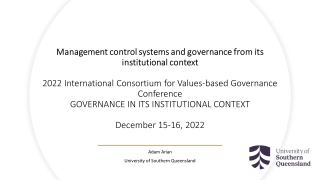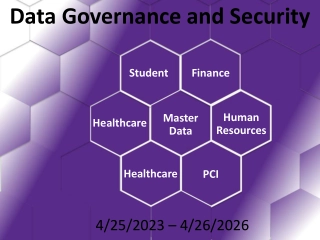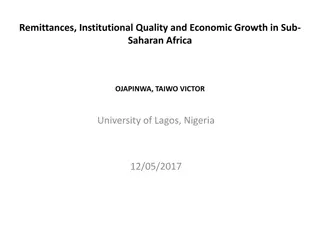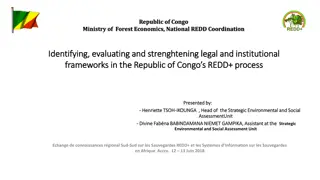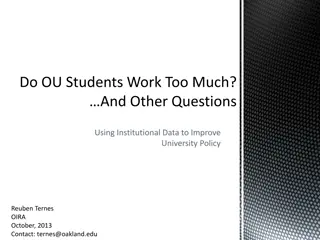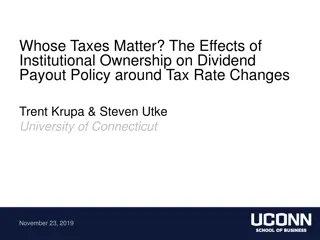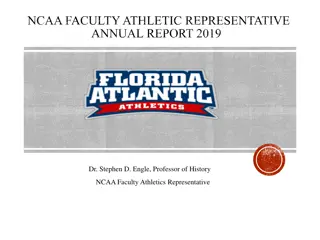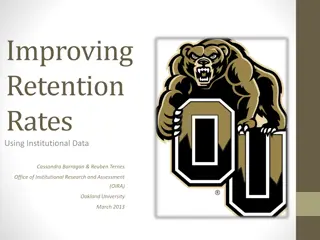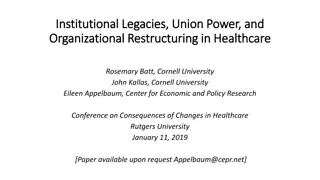Management Control Systems and Governance in the Institutional Context
Explore the role of management control systems (MCSs) and governance structures in the institutional context, focusing on the impact of organizational values, beliefs, and norms. Examine how intangible mechanisms interact with MCSs to improve corporate governance. This topic is particularly relevant
6 views • 10 slides
Understanding Data Governance and Security in Higher Education Institutions
Data governance and security play a critical role in ensuring the effective utilization, quality, and security of institutional data in higher education settings. This involves establishing processes, policies, and standards to support data governance goals such as data security, reliability, standa
3 views • 13 slides
INSTITUTIONAL GOVERNANCE FRAMEWORK
Currently, there is a lack of formal structure in the Institutional Housing Governance Framework (IHGF) within the public service system, leading to inefficiencies in managing institutional housing policies. This absence has resulted in deteriorating state assets, unmet housing demands, and ineffect
0 views • 17 slides
Challenges of Institutional Housing Governance Reforms in the Public Service System
Lack of a formal Institutional Housing Governance Framework in the Public Service System has led to issues in fair distribution of housing for civil servants, impacting their job performance and social welfare. The government's efforts to improve the situation have not yielded the desired results, p
0 views • 10 slides
Presentation to the Portfolio Committee
Overview of the state of governance in the higher education sector, including key roles, institutional statutes, and the composition of councils. Highlights include the regulations under the Higher Education Act and the publication dates of institutional statutes for various universities. Emphasis i
2 views • 83 slides
Enhancing Student Experience in Higher Education through Data-Driven Approaches
Dr. Lulamile Ntonzima, the University Registrar at WSU, brings a wealth of experience in academia and administration. With a focus on optimizing student experience, he emphasizes the pivotal role it plays in academic success and institutional reputation. Leveraging data-driven strategies, Dr. Ntonzi
0 views • 27 slides
The Main Factors That Influence the Consumer Buyer Behavior
Consumer buyer behavior is influenced by various factors such as cultural, social, personal, and psychological elements. Culture, social factors like family and opinion leaders, personal factors such as age, occupation, lifestyle, and personality, as well as psychological factors like motivation, pl
2 views • 8 slides
Promoting Private Sector Engagement in Local Governance through PPPs in Zambia
This presentation outlines the promotion of private sector engagement in local governance in Zambia through Public-Private Partnerships (PPPs). It covers the legal and institutional frameworks, processes, sub-national level PPP projects, current initiatives, lessons learned, and conclusions. The ove
2 views • 23 slides
Institutional Review Board
The Institutional Review Board (IRB) at AUCA plays a vital role in reviewing and approving research projects involving human subjects to ensure ethical standards are met. This includes obtaining informed consent, protecting privacy, and following international guidelines. Research must contribute to
0 views • 22 slides
Strengthening Institutional Capacity for Nagoya Protocol Implementation in Uganda
Uganda, known for its exceptional biodiversity and diverse indigenous ethnic groups, faces challenges of biodiversity decline and disappearing traditional knowledge associated with genetic resources. The Nagoya Protocol on Access to Genetic Resources and Benefit Sharing (ABS) presents an opportunity
0 views • 17 slides
Analysis of Individual Risk Factors in Ventral Hernia Repair Outcomes
This study explores the impact of various risk factors on predicting adverse outcomes of ventral hernia repair using data from the Abdominal Core Health Quality Collaborative (ACHQC). The research aims to quantify and compare the influence of different factors, hypothesizing that hernia- and procedu
0 views • 14 slides
Understanding Environmental Factors in Terrestrial and Aquatic Environments
Environmental factors play a crucial role in shaping ecosystems. In both terrestrial (land) and aquatic (water) environments, organisms are influenced by abiotic factors such as temperature, light intensity, and pH, as well as biotic factors like plants, predators, and competitors. Understanding the
4 views • 19 slides
Factors Affecting Microbial Growth in Food: Intrinsic and Extrinsic Factors
In food, microbial growth is influenced by intrinsic factors like pH, water activity, nutrient content, and extrinsic factors such as environmental conditions. The pH level, moisture content, and water activity play crucial roles in determining the growth of microorganisms, with specific ranges affe
0 views • 23 slides
Factors Influencing Customer Choice: Psychological, Sociocultural, Economic, and Government Factors
Psychological factors, such as perception and lifestyle, play a key role in customer choice. Sociocultural influences from society and culture also impact decisions, while economic factors like income levels and government policies can sway customer preferences. Understanding these factors is crucia
0 views • 18 slides
Maximizing Institutional Impact through ACE Centers of Excellence
ACE Impact Centers of Excellence benefit from strong institutional support and are crucial for catalyzing broader teaching and research excellence. The DLI.7 framework outlines various elements that support global best practices in Higher Education, emphasizing the importance of institutional owners
0 views • 17 slides
Comprehensive Guide to Factorization in Mathematics
Explore the concept of factorization in algebraic expressions, including the definition of factors, common factors, methods of factorization, and illustrated examples. Learn about finding factors, common factors, and various factorization techniques such as common factors method and regrouping of te
0 views • 13 slides
Role of Institutional Quality on Remittances and Economic Growth in Sub-Saharan Africa
The study explores the impact of institutional quality, both financial and non-financial, on the relationship between remittances and economic growth in Sub-Saharan Africa. It delves into how factors like control of corruption, political stability, rule of law, and democratic accountability influenc
0 views • 18 slides
Institutional Arrangement for GRP Compilation: Challenges and Solutions
The content discusses the institutional arrangement for compiling Gross Regional Products (GRPs) by either regional statistical offices or National Statistical Offices (NSO). It highlights the pros and cons of both approaches, focusing on factors like regional demand, fiscal constraints, data accura
0 views • 5 slides
Exploring Civic Virtue and Institutional Design in Early Modern Governance
Delve into the complexities of civic virtue and institutional design in early modern governance through a 3,000-word essay. Analyze the necessity of civic virtue within the state and consider contrasting perspectives on whether institutional design can replace it. Use primary texts to support your a
0 views • 32 slides
Impact of UN Guidelines on Foster Care and Institutional Care of Young Children in Europe and Central Asia
Professor Kevin Browne and Dr. Shihning Chou conducted a study on the impact of UN guidelines on foster care and institutional care of young children in Europe and Central Asia. The research highlights the physical harm and neural damage caused to children in institutional care without a parent. It
0 views • 11 slides
Strengthening Legal and Institutional Frameworks for REDD+ in Republic of Congo
The Ministry of Forest Economics in the Republic of Congo, along with the National REDD Coordination, is actively identifying, evaluating, and strengthening the legal and institutional frameworks for the REDD+ process. Progress reports highlight the establishment of institutional arrangements, imple
0 views • 10 slides
Institutional Assessment & Research at Wentworth Institute of Technology
Wentworth Institute of Technology excels in accreditation, institutional assessment, and research. The institution's leadership program oversees accreditation efforts to ensure educational effectiveness. They focus on assessing student learning outcomes, measuring educational effectiveness, and cond
0 views • 5 slides
Understanding Diversity in the Norwegian Higher Education Landscape
Exploring the concept of institutional diversity in the Norwegian higher education system, this project delves into measuring institutional profiles, the significance of diversity, why it is perceived as positive, and the factors influencing diversity control. Through insights from experts like Ole-
0 views • 30 slides
Institutional Assessment and Effectiveness Workshop Achievements at SUNY Oneonta
The Office of Institutional Assessment and Effectiveness at SUNY Oneonta has made significant progress in developing assessment protocols and processes, leading to a culture of assessment. This includes completing planning and assessment cycles, establishing objectives and procedures, and aligning u
1 views • 16 slides
Ecological Factors and Climatic Influences on Plant Life
Ecological factors play a crucial role in shaping the environment for organisms to thrive. This includes living (biotic) and non-living (abiotic) components like climatic factors, edaphic factors, topographic factors, and biotic factors. Climatic factors such as light, temperature, water, wind, and
0 views • 14 slides
Utilizing Institutional Data to Enhance University Policy: Insights from Oakland University Research
Extracting valuable insights from institutional data, the Office of Institutional Research and Assessment at Oakland University conducts various research activities to improve university policy. Through surveys and internal research, they address important questions like student workload, financial
0 views • 18 slides
Influence of Personal Demographic and Institutional Variables on Venture Creation in Small Technology-Oriented Ventures
This research study explores the impact of personal demographic and institutional factors on venture creation in small technology-oriented ventures. It delves into the influence of individual characteristics like age, gender, education, and social institutions such as family role models on entrepren
0 views • 39 slides
Understanding Factors and Prime Factors in Mathematics
Explore the concept of factors and prime factors through practical scenarios involving Jedward, stationary supplies, and school choirs. Learn how to find factors of numbers like 18 and 30, identify prime numbers, write numbers as products of prime factors, determine common factors, and calculate low
0 views • 19 slides
Understanding Mesopic Factors in Roadway Calculations
Exploring the incorporation of mesopic factors into roadway calculations and how different design luminance ranges and Scotopic/Photopic (S/P) ratios interact with various calculation methods. The discussion includes factors as defined in TM-12 and proposed for RP-8, along with IES RP-8's Mesopic Fa
0 views • 37 slides
Institutional Effectiveness and Assessment at B-CU
Jennifer Dash, Director of Institutional Assessment, and Dorian Hooks, Institutional Assessment Coordinator at B-CU, lead the efforts in understanding institutional effectiveness and assessment. Capacity building, creating a common vision, and a framework for institutional effectiveness are highligh
0 views • 35 slides
Effects of Institutional Ownership on Dividend Payout Policy
This study examines how a firm's ownership structure, particularly institutional ownership, influences its dividend policy around tax rate changes. It explores the impact of tax-sensitive/insensitive institutional ownership, the role of dedicated institutions as monitors, and the interaction between
1 views • 26 slides
NCAA Faculty Athletics Representative Annual Report 2019
Dr. Stephen D. Engle, a Professor of History, serves as the NCAA Faculty Athletics Representative (FAR) and Chair of the Inter-Collegiate Athletic Committee. The report outlines the general responsibilities of the FAR, including overseeing sub-committees on Academic Performance, Institutional Contro
1 views • 13 slides
Factors Influencing Gestation Length in Various Animals
This comprehensive guide explores the factors affecting gestation length in different animals, including cattle, mares, sheep, goats, camels, buffaloes, dogs, and cats. It covers factors that prolong gestation, such as genetic factors, deficiencies in minerals and vitamins, anomalies in the fetus, a
0 views • 18 slides
Role and Functions of Institutional Research in Higher Education
This content discusses the importance of developing duties and functions for Institutional Research (IR) professionals in higher education institutions. It highlights the key responsibilities of IR, such as identifying information needs, collecting and analyzing data, serving as data stewards, and e
0 views • 21 slides
Opportunities to Mobilize Institutional Investment in Capital Markets
Aligning trillions of dollars managed by OECD institutional investors towards green infrastructure investments presents a significant opportunity. Currently, only a small percentage of large pension fund assets are directed towards infrastructure, with an even smaller fraction allocated to green pro
0 views • 4 slides
Cross-National & Cross-Cultural Risk Factors for Offending
Explore key risk factors for offending across nations & cultures, analyzing homicide rates, structural differences, individual/family factors, and the generalizability of crime risk factors. Learn about findings related to impulsivity, achievement, conduct problems, family supervision, parenting sty
0 views • 13 slides
Factors Influencing Voting Behavior: A Comprehensive Analysis
This essay evaluates various factors influencing voting behavior, including media, social class, age, gender, geography, ethnicity, party leader image, issues, rational choice, party affiliation, tactical voting, dealignment, third-party choices, and non-voting. It discusses the relative importance
0 views • 12 slides
Promoting Student Success at Clayton State University
The role of the president in driving student success at any institution is crucial. This involves actively supporting students, staff, and institutional efforts, as well as addressing challenges and embracing a culture of progress. Data on institutional characteristics, such as average age, full-tim
0 views • 42 slides
Enhancing Student Retention Rates through Institutional Data Analysis
Explore how Oakland University's Office of Institutional Research and Assessment leverages various data sources, policy analysis, and predictive modeling to improve student success and retention. Discover the role of IR offices, available resources, survey data, and the importance of collaboration f
0 views • 33 slides
Examining Union Power and Institutional Legacies in Healthcare Organizational Restructuring
Challenges faced by healthcare unions due to institutional legacies and shifts in the healthcare system are explored. The study delves into the variation in union success, emphasizing local institutional contexts in the U.S. and power dynamics between employers and unions rooted in historical contin
0 views • 16 slides
